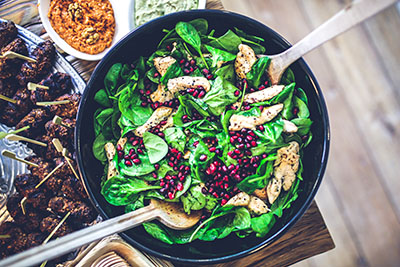Gut Health and the Microbiome
Gut health and inflammation are the new buzz words in the health and wellness community. Is this a fad or is there really something to it? The short answer is there is really something to it. Digestive issues are among of the most common complaints we see in a primary care practice and is increasing in prevalence largely due to the Standard American Diet (SAD) and widespread use of antibiotics. What we now know is that the human body is one BIG microbiome (microbes living on and in our bodies) and a healthy human microbiome is essential to our immunity, metabolism, and bodily functions as well as an important modifier of chronic disease. The human microbiome was extensively researched by the Human Microbiome Project in 2007 (NIH Study) and found that inflammation of the gut and the lack of diverse healthy bacteria may account for a host of inflammatory diseases. Common symptoms can include stomach upset, abdominal bloating and cramping, multiple food sensitivities and allergies, and diarrhea or constipation (or both). What can you do if you suffer from this common and frustrating problem? Read up on the Microbiome or Microbiota and consider the following:
Food Elimination Diets
Food elimination diets can be quite helpful with digestive issues. It is usually recommended that when trying a food group elimination diet that you do it for 2 or 3-weeks to see if a particular food group may be causing your symptoms. Eliminating gluten OR dairy initially is a good place to start. It is important to remember to only eliminate ONE FOOD GROUP at a time. If neither of these elimination diets improve symptoms, another approach to try is the FODMAP diet (elimination of foods with naturally high sugar content which can cause excess fermentation in the gut). Avoiding sugary drinks and too much caffeine can also be helpful.
Probiotics
Not all probiotics are created equal and certain strains of probiotics work on certain types of gut problems but not others. For example, for IBS type symptoms, Culturelle or Align have been extensively studied and found to be very helpful for many patients.
Managing your stress
There is a definite correlation between increased stress and anxiety and worsening gut issues because “your brain lives in your gut” vice versa. This is due to the HPA axis which is the body’s major neuroendocrine system that controls various body processes in response to stress, including your gut. Emerging research has shown that meditation and hypnosis can be most helpful with IBS symptoms and can also lower your anxiety and stress.
Consider Botanicals and herbal supplements
There are herbal supplements available to help improve and heal your gut depending on the cause. Some favorites for IBS are a proprietary 9-herbal combination called Iberogast, as well as ginger, enteric coated peppermint oil capsules, fish oil and Berberine. For leaky gut the list would include aloe vera, marshmallow, DGI and slippery elm. Some herbal supplements balance the PH/bacteria in your gut while others coat and heal your gut.
Consider Antibiotic treatment
Some individuals with IBS actually have SIBO (small intestinal bowel overgrowth) and may benefit from treatment with a combination of anti-infective herbals or prescription antibiotics for several weeks such as Rifaximin/Xifaxan.
For more information on this important topic check out these resources:
https://chriskresser.com/the-gut-microbiome/
https://www.drweil.com/diet-nutrition/nutrition/eating-for-a-healthy-microbiome/

